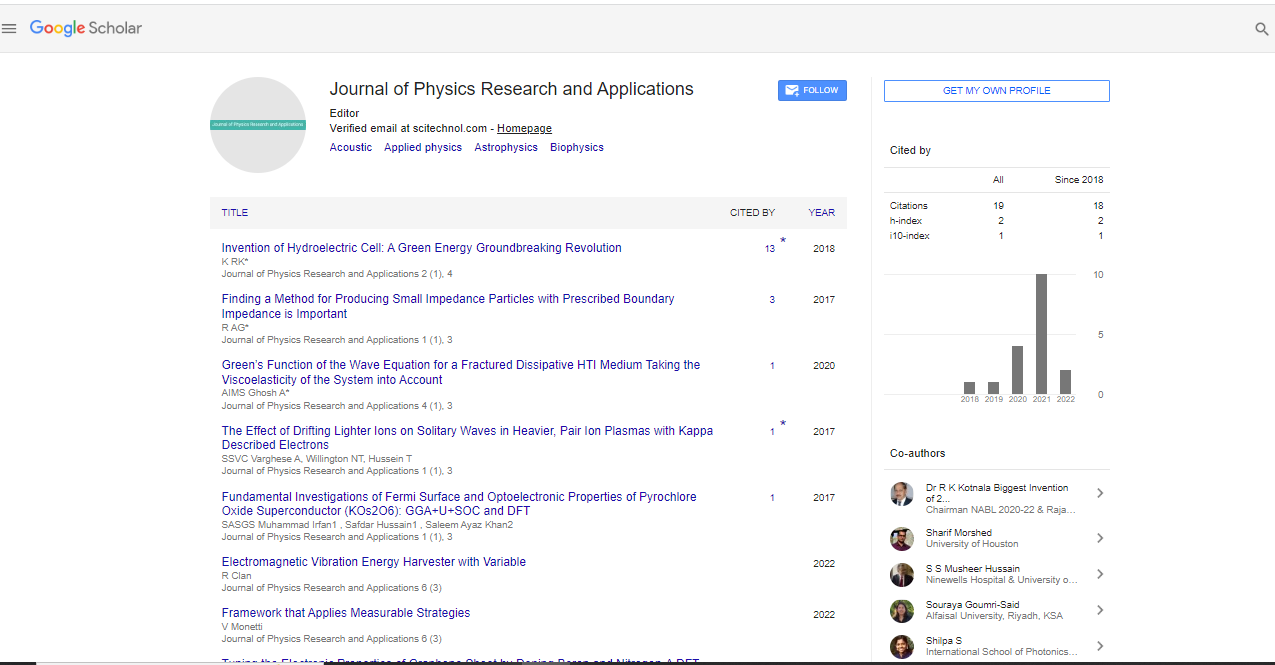Perspective, J Phys Res Appl Vol: 7 Issue: 1
Evaluating the Energy of Quantum Mechanics and its Impact on Quantum Technology
Georg Hassan*
Department of Geoscience, University of Wisconsin, Madison, USA
*Corresponding Author: Georg Hassan
Department of Philosophy of Science,
University of Pittsburgh, Pittsburgh, USA
E-mail: georghassan@uph.edu
Received date: 20 February, 2023, Manuscript No. JPRA-23-96180;
Editor assigned date: 22 February, 2023, PreQC No. JPRA-23-96180 (PQ);
Reviewed date: 09 March, 2023, QC No. JPRA-23-96180;
Revised date: 16 March, 2023, Manuscript No. JPRA-23-96180 (R);
Published date: 23 March, 2023, DOI: 10.4172/Jpra.1000026
Citation: Hassan G (2023) Evaluating the Energy of Quantum Mechanics and its Impact on Quantum Technology. J Phys Res Appl 7:1.
Description
Quantum mechanics is a fundamental theory of physics that describes the behaviour of matter and energy at the atomic and subatomic levels. It is one of the most successful theories ever developed, and it has revolutionized to understanding the universe. Quantum mechanics describes the behaviour of particles, such as electrons and photons, in terms of their quantum states. A quantum state is described by a wave function, which is a mathematical function that predicts the probability of finding the particle in a particular location at a particular time. The wave function is a fundamental concept in quantum mechanics, and it plays a central role in many of the theory's key concepts. One of the most important features of quantum mechanics is the concept of superposition. Superposition occurs when a particle exists in two or more quantum states simultaneously. This means that a particle can exist in multiple locations or have multiple energies at the same time. Superposition is a fundamental concept in quantum mechanics, and it is essential to understanding many of the theory's key concepts.
Another important principle in quantum mechanics is quantum entanglement. Entanglement occurs when two particles become linked in such a way that the state of one particle is dependent on the state of the other particle, regardless of the distance between them. Entanglement is a strange and counterintuitive concept, but it has been demonstrated experimentally and is essential to some of the most promising technologies based on quantum mechanics, such as quantum computing and quantum cryptography. One of the most famous concepts in quantum mechanics is the uncertainty principle. According to the uncertainty principle, certain pairings of physical attributes, such as position and momentum, cannot be accurately known at the same time. That is, the more precisely one knows a particle's position, the less precisely one can measure its momentum, and vice versa. The uncertainty principle is a fundamental concept in quantum mechanics, and it has profound implications for understanding the behaviour of matter and energy at the subatomic level. Quantum mechanics has had a significant impact on technology, leading to the development of many new and exciting technologies. One of the most promising applications of quantum mechanics is quantum computing. Unlike classical computers, which rely on bits that can only be in one state (either 0 or 1), quantum computers use qubits, which can exist in multiple states simultaneously. This allows quantum computers to perform certain calculations much faster than classical computers, which has important implications for fields such as cryptography and artificial intelligence. Quantum mechanics has also led to the development of new technologies in the fields of medicine, energy, and telecommunications. For example, quantum mechanics is being used to develop new materials for energy storage and more accurate diagnostic tools for medical imaging.
Conclusion
Quantum mechanics is a fundamental theory of physics that describes the behaviour of matter and energy at the atomic and subatomic levels. Advancements in quantum technology have opened up new opportunities for exploring the energy of quantum mechanics and developing new applications in areas such as computing, cryptography, and sensing. As technology continues to advance, one can expect even more breakthroughs in the field of quantum mechanics, leading to a deeper understanding of the universe and the development of even more technologies.
 Spanish
Spanish  Chinese
Chinese  Russian
Russian  German
German  French
French  Japanese
Japanese  Portuguese
Portuguese  Hindi
Hindi 
